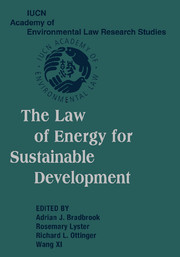Book contents
- Frontmatter
- Contents
- Acknowledgments
- Message from Kofi A. Annan, Secretary-General, United Nations
- Introduction – A Global Learned Society to Address Earth's Evolution: The IUCN Academy of Environmental Law
- Public Lectures on International Environmental Law
- PART ONE SUSTAINABLE DEVELOPMENT AND THE ROLE OF ENERGY LAW
- PART TWO LEGAL ISSUES IN CONTEMPORARY ENERGY LAW
- PART THREE INTERNATIONAL ENERGY LAW
- 11 International Law and Global Sustainable Energy Production and Consumption
- 12 Policy Options
- 13 Financing Energy for Sustainable Development
- 14 The Clean Development Mechanism and UNFCCC / Kyoto Protocol Developments
- 15 The Report of the World Commission on Dams: Some Implications for Energy Law
- 16 International Issues for Sustainable Development: IUCN Perspective
- 17 Enhanced Implementation and Enforcement of International Environmental Laws by the Judiciary
- PART FOUR COMPARATIVE ENERGY LAW
- PART FIVE ELECTRICITY RESTRUCTURING
- PART SIX FINANCING FOR SUSTAINABLE ENERGY
- PART SEVEN CIVIL SOCIETY AND THE PROCEDURAL REQUIREMENTS OF ENERGY LAW FOR SUSTAINABLE DEVELOPMENT
- Index
13 - Financing Energy for Sustainable Development
Published online by Cambridge University Press: 10 August 2009
- Frontmatter
- Contents
- Acknowledgments
- Message from Kofi A. Annan, Secretary-General, United Nations
- Introduction – A Global Learned Society to Address Earth's Evolution: The IUCN Academy of Environmental Law
- Public Lectures on International Environmental Law
- PART ONE SUSTAINABLE DEVELOPMENT AND THE ROLE OF ENERGY LAW
- PART TWO LEGAL ISSUES IN CONTEMPORARY ENERGY LAW
- PART THREE INTERNATIONAL ENERGY LAW
- 11 International Law and Global Sustainable Energy Production and Consumption
- 12 Policy Options
- 13 Financing Energy for Sustainable Development
- 14 The Clean Development Mechanism and UNFCCC / Kyoto Protocol Developments
- 15 The Report of the World Commission on Dams: Some Implications for Energy Law
- 16 International Issues for Sustainable Development: IUCN Perspective
- 17 Enhanced Implementation and Enforcement of International Environmental Laws by the Judiciary
- PART FOUR COMPARATIVE ENERGY LAW
- PART FIVE ELECTRICITY RESTRUCTURING
- PART SIX FINANCING FOR SUSTAINABLE ENERGY
- PART SEVEN CIVIL SOCIETY AND THE PROCEDURAL REQUIREMENTS OF ENERGY LAW FOR SUSTAINABLE DEVELOPMENT
- Index
Summary
INTERNATIONAL DIALOGUE ON ENERGY FOR SUSTAINABLE DEVELOPMENT
Financing energy for sustainable development is a crucial element of the challenges posed by the implementation of Agenda 21. Although it was considered crucial for development, energy for sustainable development was not explicitly addressed at the Rio Conference. However, energy, in relation to the environment and development, has been specifically treated in Agenda 21, in chapters 9 (“Atmosphere”), 14 (“Agriculture and Rural Development”), and 7 (“Human Settlements”).
International dialogue in relation to energy and the challenge of sustainability is relatively recent and in fact, energy, in its entirety, was discussed for the first time at an intergovernmental level during the Ninth Session of the UN Commission on Sustainable Development (CSD-9). One significant feature of this dialogue was that it involved consultation with, and input from, relevant stakeholders: it was a more inclusive process than ever before. Following CSD-9, energy figured prominently at the World Summit on Sustainable Development (WSSD).
The outcomes of CSD-9 and the WSSD Johannesburg Plan of Implementation (Johannesburg Plan) on energy for sustainable development have focused attention on certain key energy issues as well as options and strategies to address them. The inputs provided by different stakeholders – academia, business and industry, nongovernmental organisations (NGOs), and other members of civil society – as well as several analytical studies and reports, notably the World Energy Assessment (WEA), as well as reports by the World Energy Council and the International Energy Agency (IEA) have proved valuable and indeed, helped to shape these outcomes.
- Type
- Chapter
- Information
- The Law of Energy for Sustainable Development , pp. 222 - 230Publisher: Cambridge University PressPrint publication year: 2005

